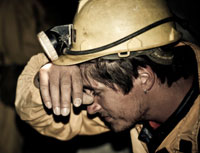
May 9, 2012 will mark the 20th anniversary of one of Canada’s worst mining disasters—a methane gas explosion that claimed 26 workers’ lives at the Westray Mine in Plymouth, NS.
Workers, union officials and government mine inspectors had expressed concern about safety at the mine prior to the explosion, but management did not initiate changes to make conditions safer.
Another important anniversary has just passed—the eighth anniversary of Bill C-45, or the “Westray Bill.” The legislation, referenced under section 217.1 of the Canadian Criminal Code, states that “Every one who undertakes or has the authority to direct how another person does work or performs a task, is under a legal duty to take reasonable steps to prevent bodily harm to that person, or any other person, arising from that work or task.”
C-45 imposes potentially severe penalties on individuals and corporations found criminally liable for violations resulting in death and injuries. These penalties include the potential for life imprisonment for convicted individuals and unlimited fines for corporations.
While the legislation undoubtedly has teeth, very few companies and individuals have been bitten since C-45 became law on March 31, 2004. Only two convictions have occurred—both of those in Quebec.
Transpavé, a Montreal-area paving stone company, was the first organization convicted under C-45 provisions, early in 2008. Transpavé pleaded guilty to criminal negligence causing death and was fined $110,000 after a worker was fatally crushed by a machine whose light curtain guarding system had been disabled.
More recently, following a trial, Quebec landscape contractor Pasquale Scrocca was found guilty of criminal negligence causing the death of a worker. Aniello Boccanfuso died after being struck by a backhoe and pinned against a wall.
An investigation found that the backhoe was poorly maintained by Scrocca and had brakes that worked at less than one-third their intended stopping capacity. Scrocca was given a sentence of two-years-less-a-day, to be served with conditions, including a curfew, in the community—not a correctional institution.
Ryan J. Conlin, a partner in Toronto’s Stringer LLP Management Lawyers, says while he never expected to see a flood of convictions when C-45 legislation was enacted, “it hasn’t quite turned out the way I thought.”
Conlin says he would have expected to see half a dozen prosecutions concluded by now—not merely two.
Asked why C-45 has been slow to gain traction, Conlin points to “a continuing culture among people who enforce health and safety legislation that these cases should proceed under provincial occupational health and safety legislation (instead of under the Criminal Code of Canada).”
Also, while police are quick to investigate workplace deaths, Conlin says they tend not to have a lot of experience in recommending C-45 charges and often back away once provincial OHS investigators arrive on the scene.
And even if criminal negligence charges are pursued by Crown prosecutors, Conlin says “There’s no question that showing intent (a wanton and reckless disregard for the safety of others) is a hard burden to meet.”
As a result, several criminal negligence charges under C-45 provisions have ultimately been withdrawn by Crown prosecutors, with companies and individuals instead being found guilty of breaching less severe provincial OHS laws.
Conlin says C-45 isn’t as top of mind among corporate safety directors as it was when the legislation emerged in 2004. However, that could change with a high-profileTorontocase, which saw four workers fall to their deaths from a collapsing swing stage scaffold on Dec. 24, 2009. A fifth worker suffered critical injuries in the fall.
Metron Construction Corporation and three company officials face charges of criminal negligence causing death and criminal negligence causing bodily harm.
“If you actually see senior officers going to jail (in this multiple scaffold fatality), I think it will definitely put C-45 back on the front burner again,” says Conlin.



Leave A Comment